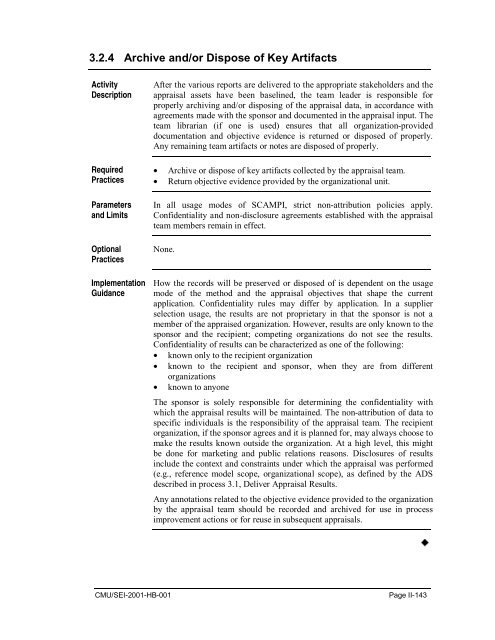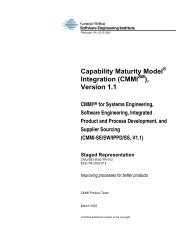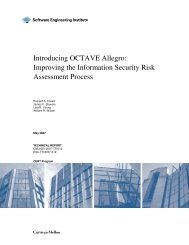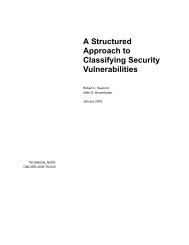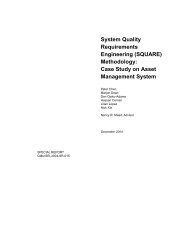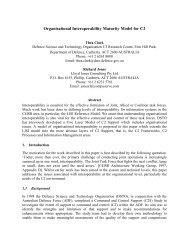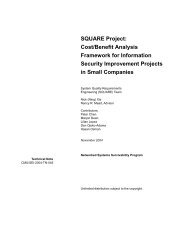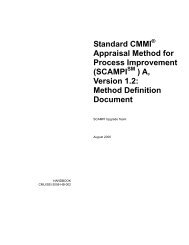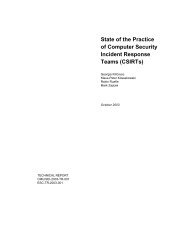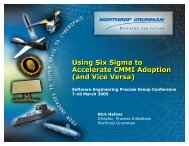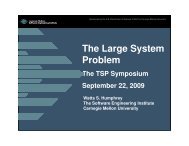Standard CMMI Appraisal Method for Process Improvement (SCAMPI)
Standard CMMI Appraisal Method for Process Improvement (SCAMPI)
Standard CMMI Appraisal Method for Process Improvement (SCAMPI)
Create successful ePaper yourself
Turn your PDF publications into a flip-book with our unique Google optimized e-Paper software.
3.2.4 Archive and/or Dispose of Key Artifacts<br />
Activity<br />
Description<br />
Required<br />
Practices<br />
Parameters<br />
and Limits<br />
Optional<br />
Practices<br />
Implementation<br />
Guidance<br />
After the various reports are delivered to the appropriate stakeholders and the<br />
appraisal assets have been baselined, the team leader is responsible <strong>for</strong><br />
properly archiving and/or disposing of the appraisal data, in accordance with<br />
agreements made with the sponsor and documented in the appraisal input. The<br />
team librarian (if one is used) ensures that all organization-provided<br />
documentation and objective evidence is returned or disposed of properly.<br />
Any remaining team artifacts or notes are disposed of properly.<br />
• Archive or dispose of key artifacts collected by the appraisal team.<br />
• Return objective evidence provided by the organizational unit.<br />
In all usage modes of <strong>SCAMPI</strong>, strict non-attribution policies apply.<br />
Confidentiality and non-disclosure agreements established with the appraisal<br />
team members remain in effect.<br />
None.<br />
How the records will be preserved or disposed of is dependent on the usage<br />
mode of the method and the appraisal objectives that shape the current<br />
application. Confidentiality rules may differ by application. In a supplier<br />
selection usage, the results are not proprietary in that the sponsor is not a<br />
member of the appraised organization. However, results are only known to the<br />
sponsor and the recipient; competing organizations do not see the results.<br />
Confidentiality of results can be characterized as one of the following:<br />
• known only to the recipient organization<br />
• known to the recipient and sponsor, when they are from different<br />
organizations<br />
• known to anyone<br />
The sponsor is solely responsible <strong>for</strong> determining the confidentiality with<br />
which the appraisal results will be maintained. The non-attribution of data to<br />
specific individuals is the responsibility of the appraisal team. The recipient<br />
organization, if the sponsor agrees and it is planned <strong>for</strong>, may always choose to<br />
make the results known outside the organization. At a high level, this might<br />
be done <strong>for</strong> marketing and public relations reasons. Disclosures of results<br />
include the context and constraints under which the appraisal was per<strong>for</strong>med<br />
(e.g., reference model scope, organizational scope), as defined by the ADS<br />
described in process 3.1, Deliver <strong>Appraisal</strong> Results.<br />
Any annotations related to the objective evidence provided to the organization<br />
by the appraisal team should be recorded and archived <strong>for</strong> use in process<br />
improvement actions or <strong>for</strong> reuse in subsequent appraisals.<br />
<br />
CMU/SEI-2001-HB-001<br />
Page II-143


